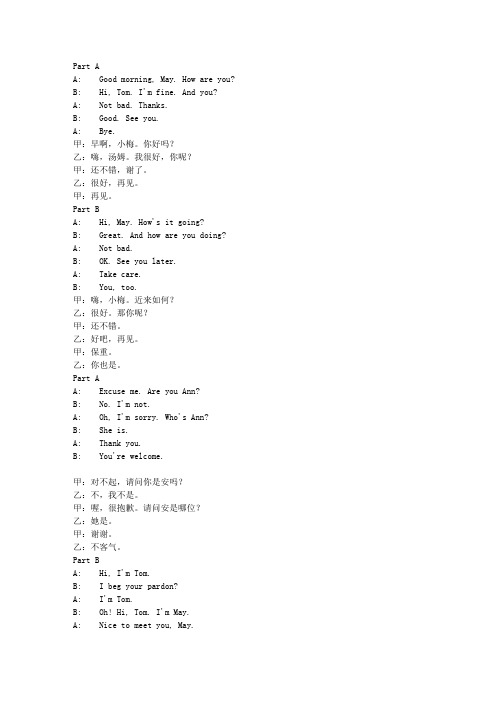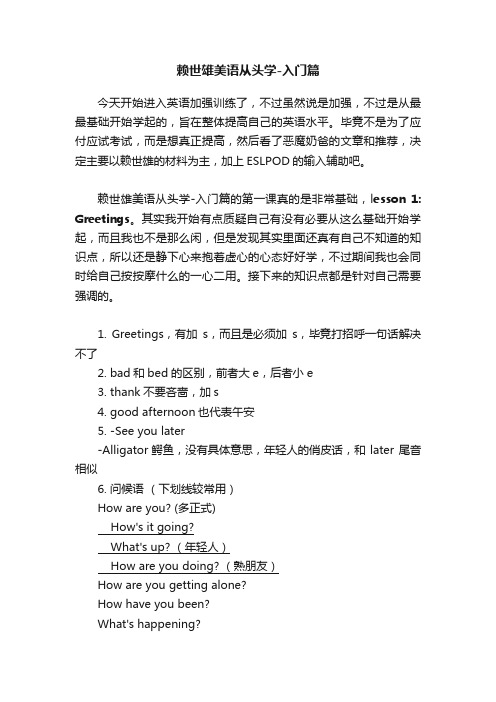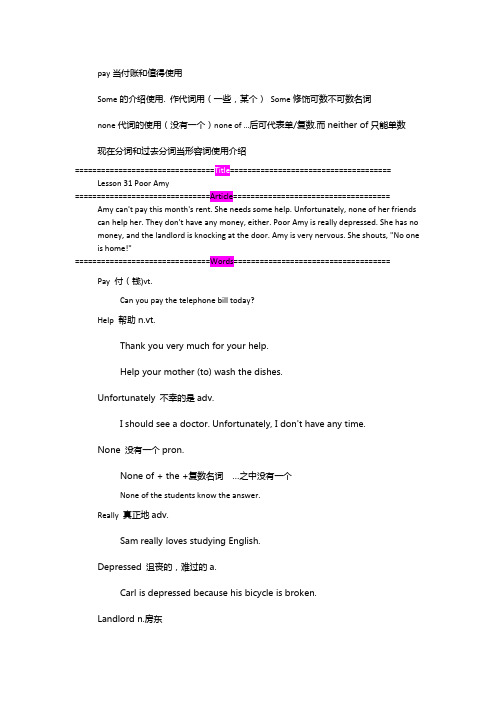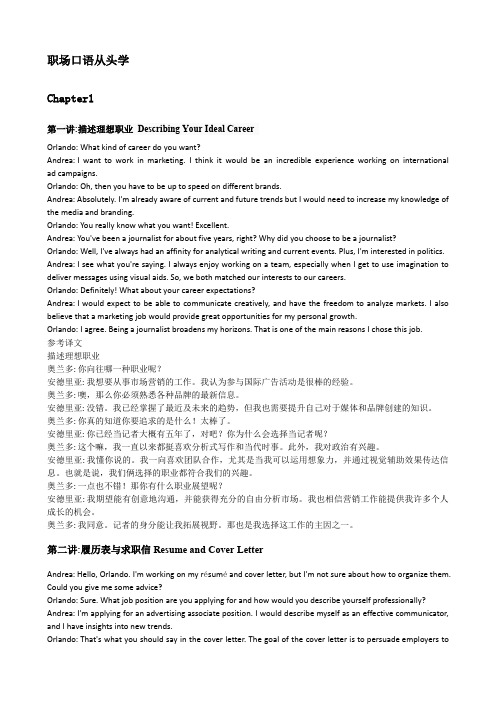(完整word版)赖世雄美语从头学-初级篇(上)
赖世雄初级美语入门篇

cmczbms2004-12-06 12:09 Lesson 01greetingsADon't forget to say greetings to uncle Wang.#见到王伯伯的时候不要忘了向他问好。
I hope you have a good morning.Who are you? #你是谁?Where are you? #你在哪儿?How are you? #你好吗?回答用,I'm fine.I'm a boy. You are a boy. He is a boy.This bed is bad. #这个床很坏。
注意bed和bad的发音区别。
I see you there. #我看见你在那里。
See you. = Good bye. = Bye. = See you later.Bhi和hey的区别。
How's it going?Great. = Wonderful. = Cool.How are you doing? =How're you doing? = How are you?#回答用not bad。
take care#保重。
take care of yourself.You tooHave a good time. #过你愉快。
Thanks. You too.#谢谢,你也一样。
DialogAA: Good morning, May. How are you? B: Hi, Tom. I’m fine. And you?A: Not bad. Thanks.B: Good. See you.A: Bye.BA: Hi, May. How’s it going?B: Great. And how are you doing? A: Not bad.B: Ok. See you later.A: Take care.B: You too.A甲:早啊,小梅。
赖世雄初级美语讲解修正第一版

Lesson 1 Self IntroductionThe lesson is very good. Lesson one lesson two“My name is Robert. My friends call me Bob. I am twenty years old. I am Chinese. I come from Beijing. There are six people in my family. I have one younger sister and two old brothers. We are not rich, but we are a happy family.”Part one 第一部分reading 阅读My bicycle my homeWhat’s your name, please? Open the door, please. My name is Peter.Call me, please. Call me when you have time. Give me a call when you have time. 8:18I am ten years old. He is one year old.I am twenty years of age. I am twenty. How old are you?I am a Chinese. 名词中国人I am Chinese. 形容词中国人的American 美国人(名词)He is an American. He is American. 美国人的(形容词)This is a book. I come from Guangdong. He comes from Sichuan. I am from Beijing.Where are you from? Where do you come from?I am from Beijing. I come from Beijing. 18:56There is a book on the desk. 有……. There is a cat in the room.People 两个人以上才能用一个人用one person Two persons 两个人= two peopleThree people four peopleI have a book. He has a book. 主语有思想,有生命25:09 SubstitutionsLesson 2 Nice to Meet You“HI! My name is Mike. Hi! I’m Nancy. Nice to meet you. Nice to meet you, too. Where are you from? I’m from Shanghai. And you? I’m from Chicago. ” 1:31 Hi! I am Mike. I’m Mike. HI! There. 嗨!你好。
赖世雄英语入门

Part AA: Good morning, May. How are you? B: Hi, Tom. I'm fine. And you?A: Not bad. Thanks.B: Good. See you.A: Bye.甲:早啊,小梅。
你好吗?乙:嗨,汤姆。
我很好,你呢?甲:还不错,谢了。
乙:很好,再见。
甲:再见。
Part BA: Hi, May. How's it going?B: Great. And how are you doing? A: Not bad.B: OK. See you later.A: Take care.B: You, too.甲:嗨,小梅。
近来如何?乙:很好。
那你呢?甲:还不错。
乙:好吧,再见。
甲:保重。
乙:你也是。
Part AA: Excuse me. Are you Ann?B: No. I'm not.A: Oh, I'm sorry. Who's Ann?B: She is.A: Thank you.B: You're welcome.甲:对不起,请问你是安吗?乙:不,我不是。
甲:喔,很抱歉。
请问安是哪位?乙:她是。
甲:谢谢。
乙:不客气。
Part BA: Hi, I'm Tom.B: I beg your pardon?A: I'm Tom.B: Oh! Hi, Tom. I'm May.A: Nice to meet you, May.B: Pleased to meet you.甲:嗨,我是汤姆。
乙:对不起,请再说一遍好吗?甲:我是汤姆。
乙:哦!嗨,汤姆。
我是小梅。
甲:很高兴认识你,小梅。
乙:幸会,幸会。
Part AA: Excuse me. What's your name?B: I'm May.A: Hi, May. Where are you from?B: I'm from Hong Kong. What about you? A: I'm From Japan.甲:对不起。
赖世雄教美语

you are very nice. They are very nice.
I am cery nice. He is hungery. He is hungery now.
I will see you tomorrow. I saw her yesterday. You are cuit. You are welcome.
No,I'm not. I'm sorry.
Who's Ann? she is. thank you, you're welcome.
(I love you./I love him/I love her I have to go!
Where is the station?
Are you happy? No, I'm not)
May I have your name,please?
My family name is Chen,and my given name is Lipei,but you may call me Peter.
Or,Chen is my family name,Lipei is my given name ,but you may call me Peter.
I'm a boy. It's a book. you're very kind.
I am=I'm we are=we're you are=you're he is=he's she is=she's it is=it"s they are=they're T
赖世雄美语从头学-入门篇

赖世雄美语从头学-入门篇今天开始进入英语加强训练了,不过虽然说是加强,不过是从最最基础开始学起的,旨在整体提高自己的英语水平。
毕竟不是为了应付应试考试,而是想真正提高,然后看了恶魔奶爸的文章和推荐,决定主要以赖世雄的材料为主,加上ESLPOD的输入辅助吧。
赖世雄美语从头学-入门篇的第一课真的是非常基础,lesson 1: Greetings。
其实我开始有点质疑自己有没有必要从这么基础开始学起,而且我也不是那么闲,但是发现其实里面还真有自己不知道的知识点,所以还是静下心来抱着虚心的心态好好学,不过期间我也会同时给自己按按摩什么的一心二用。
接下来的知识点都是针对自己需要强调的。
1. Greetings,有加s,而且是必须加s,毕竟打招呼一句话解决不了2. bad和bed的区别,前者大e,后者小e3. thank不要吝啬,加s4. good afternoon也代表午安5. -See you later-Alligator 鳄鱼,没有具体意思,年轻人的俏皮话,和later尾音相似6. 问候语(下划线较常用)How are you? (多正式)How's it going?What's up? (年轻人)How are you doing? (熟朋友)How are you getting alone?How have you been?What's happening?7. 问候答句区别a. 都有youHow are you?=How are you doing?=How are you getting alone?answer:I'm fine, thank you. (跟fine有关的回答持保留意见,比较多说法是一般不用fine这种回答,我个人听到最多的就是good) Fine, thanks.Great, thanks.Not bad, thanks.So-so, thank you.b. How have you been?这个问法是完成时,所以不能用amanswer:I have been fine, thank you.Fine, thank you.c. How's it going?answer: Not bad, thank you.So-so, thank you.Great, thank you.Fine, thank you.d. What's up/What's happening?answer: Nothing much.Same as usual.8. 感谢Thanks a lot. (非正式)Thanks a million (俏皮话)Lesson 2 Courtesy (礼貌)Idiom: Courtesy costs nothing. 礼貌不花钱;礼多人不怪。
(完整word版)赖世雄美语从头学初级篇Lesson31学习笔记

pay当付账和值得使用Some的介绍使用. 作代词用(一些,某个)Some修饰可数不可数名词none代词的使用(没有一个)none of …后可代表单/复数.而neither of只能单数现在分词和过去分词当形容词使用介绍===================================================================== Lesson 31 Poor Amy===============================Article==================================== Amy can't pay this month's rent. She needs some help. Unfortunately, none of her friends can help her. They don't have any money, either. Poor Amy is really depressed. She has no money, and the landlord is knocking at the door. Amy is very nervous. She shouts, "No one is home!"===============================Words==================================== Pay 付(钱)vt.Can you pay the telephone bill today?Help 帮助n.vt.Thank you very much for your help.Help your mother (to) wash the dishes.Unfortunately 不幸的是adv.I should see a doctor. Unfortunately, I don't have any time.None 没有一个pron.None of + the +复数名词…之中没有一个None of the students know the answer.Really 真正地adv.Sam really loves studying English.Depressed 沮丧的,难过的a.Carl is depressed because his bicycle is broken.Landlord n.房东Tenant n.租客Knock 敲(门)vi.Knock the door 错Knock at the door对Nervous 紧张的a.Exams make me very nervous.Shout vt.高呼,大声说出My teacher often shouts, "shut up!" when we are noisy.==============================Grammar=================================== 形容词some,及代词none的用法Some 用法She needs some help.此处some为形容词,表示“一些”。
赖世雄职场口语从头学

职场口语从头学Chapter1第一讲:描述理想职业Describing Your Ideal CareerOrlando: What kind of career do you want?Andrea: I want to work in marketing. I think it would be an incredible experience working on international ad campaigns.Orlando: Oh, then you have to be up to speed on different brands.Andrea: Absolutely. I'm already aware of current and future trends but I would need to increase my knowledge of the media and branding.Orlando: You really know what you want! Excellent.Andrea: You've been a journalist for about five years, right? Why did you choose to be a journalist?Orlando: Well, I've always had an affinity for analytical writing and current events. Plus, I'm interested in politics. Andrea: I see what you're saying. I always enjoy working on a team, especially when I get to use imagination to deliver messages using visual aids. So, we both matched our interests to our careers.Orlando: Definitely! What about your career expectations?Andrea: I would expect to be able to communicate creatively, and have the freedom to analyze markets. I also believe that a marketing job would provide great opportunities for my personal growth.Orlando: I agree. Being a journalist broadens my horizons. That is one of the main reasons I chose this job.参考译文描述理想职业奥兰多: 你向往哪一种职业呢?安德里亚: 我想要从事市场营销的工作。
赖世雄旅游口语从头学

旅游口语从头学Chapter 1 行前事宜第一讲:计划旅行Planning a Trip计划旅行Tom: I am going to visit the Netherlands alone.Jane: Alone?Tom: Yes, I prefer DIY traveling to package tours.Jane: What are you planning to do during your stay there?Tom: Just tour around the city by bicycle.Jane: That sounds cool. How much is your budget?Tom: I'm not going to spend too much money on accommodation.Jane: Then maybe you could stay at a hostel like many backpackers do. Tom: What a good idea!汤姆:我打算独自去荷兰游玩。
简:独自一人?汤姆:是的,比起组团游我更喜欢自助旅行。
简:你打算在那里做什么?汤姆:骑车游览那座城市。
简:这听起来很酷。
你的预算是多少?汤姆:我不打算在住宿方面花太多钱。
简: 那么也许你可以像那些背包客一样,住在青年旅社。
汤姆:好主意!第二讲:咨询旅游信息Asking about Travel InformationSam: Hey, Nick I'm going to visit Thailand. You have been there before,right? Nick: Yes, do you want some suggestions?Sam: Yes.Nick: It's better to go to the seaside but try to avoid the peak season. Sam: I see. I don't want to be one of the dumplings boiling in the sea. Nick: That's what I said. Don't forget to have your room booked in advance. Sam: Of course.Nick: Be careful of the girls you meet at the pub.Sam: Why? Is it because they are gorgeous and dangerous?Nick: There is a chance that the girl you are kissing might be a guy.山姆:嘿,尼克。
- 1、下载文档前请自行甄别文档内容的完整性,平台不提供额外的编辑、内容补充、找答案等附加服务。
- 2、"仅部分预览"的文档,不可在线预览部分如存在完整性等问题,可反馈申请退款(可完整预览的文档不适用该条件!)。
- 3、如文档侵犯您的权益,请联系客服反馈,我们会尽快为您处理(人工客服工作时间:9:00-18:30)。
赖世雄美语从头学-初级篇(上)1. people表示“人们”时,只做复数用。
我们可以说two people , three people , many people等,却不可以说one people。
若欲表示“一个人”时,应说one person或a person2. 不完全及物动词:即接复合宾语动词,其后不仅跟一个宾语,同时需要一个宾语补足语,用来说明宾语的特点。
Call作为不完全及物动词they (主语)call(谓语) the girl(宾语) marry(宾语补足语)3. 在以下例句中old可以用of age代替:He is twenty years old = He is twenty years of age4. looks young for one’s age = look younger than one really isYou look young for your age = you look younger than you really are你看起来比实际年龄要轻5. See:看见,和…见面:I see my friends on the weekends我在周末和朋友见面6. During the day在白天,at night在晚上,以上两个短语做对称用法时,亦可以用by day和by night取代:John sleeps during the day and works at night = John sleeps by day and works by night7. Each other表示两者的“彼此”的意思,在句中只作宾语,句中的主语必须限定为两者;one other表示三者或三者以上的“彼此”,在句中只作宾语,句中的主语必须为三者或三者以上的人物。
8. The wangs = the wang family王氏一家人9. Same相同的,在使用本单词时,之前一定要置定冠词the10. Have做及物动词表示“有”的意思,使用have时,主语一定要是表示“人或者动物”的名词或代词:John has a dog they have many friendsThere be 也表示“有”的意思,但用法与have不同:In the room has a boy(in the room是表示场所的短语,不能做主语,使用时应于句首置there be,然后置名词,在将表示场所的短语置于句尾),改成there is a boy in the room11. Also与too均为副词,表示“也”的意思。
但使用时,too至于句尾,其前要有逗号;而also则置于一般动词之前,若与be动词或助动词并用时,则also该置于be动词或助动词之后:Tony also has a dog = Tony has a dog , too He is a student , I am also a student = He is a student , I am , too 12. Alike相同的,相似的。
使用本单词时,不可置于名词前:John and Peter are alike brothers(brothers是名词,该句错误) John and Peter are alike in many ways(正确)13. 省略句的功能就是省略两句重复的部分,使句子结构简单又不失清楚的涵义,省略句形成的先决条件是:1. 两句的结构必须相同(亦即两句有相同的时态及动词,第二句方可形成省略句)2. 第一句若为肯定句,第二句则为否定句;第一句若为否定句,第二句则为肯定句(形态有三:be动词,助动词,一般动词)14. They are brother and sister上句中brother和sister是可数名词,照理本句应为they are a brother and a sister,但两个名词代表的是相对的关系,如父子、兄妹、母子等,这些名词的不定冠词a/an就应省略,故我们应该说they are brother and sister15. The cat is running for its life猫在逃命16. 专有名词(如John)或表示“人”的普通名词(如my father)形成所有格时,要在这些专有名词或普通名词之后加“’s”,之后再接名词,即John’s book my father’s book但专有名词或普通名词之后有“s”形成复数时,则表示所有格的符号“’”要置于“s”之后,即the boys’ father17. 现在进行时语句格式:主语+be+现在分词,现在分词的形成方式如下:动词原形+ing = 现在分词1. 绝大部分的动词原形可直接加ing形成现在分词:do+ing = doing2. 但若动词以不发音的e结尾时,要先删除e,再加ing:write+ing = writing3. 若动词原形为单音短音节,且以一个短音字母结尾时,应将该字母双写,再加ing:run+ing = running18. the United States美国,美国的全称为the United States of America,一般均以the United States、the States、theU.S.称呼19. American的复数是Americans,Chinese的复数是Chinese20. All表示“全部的,所有的”,修饰三个或三个以上的人或东西。
与代词并用时,置于该代词之后(they all);与普通名词并用时,置于普通名词之前(all the boys);与专有名词并用时,置于专有名词之后(Peter , Mary and Paul all) Both表示“两者都”,用来修饰两个人或东西21. As a matter of fact = in fact事实上Overseas Chinese华侨22. Shop是不及物动词,不能接宾语;shop需接介词for,才可以接宾语:she is shopping for a new dress23. Either 与Too均为副词,二者皆表示“也”,但用法有别:1. too用于肯定句中,置于句尾,too之前置逗号2. either用于含有not的否定句中,置于句尾,either之前置逗号24. sit作为不及物动词,接介词on(表示坐在无扶手的椅子上面)/in(表示坐在有扶手的椅子上面),再接宾语25. in和at作为介词,之后均可用以表示建筑物的名词做宾语,但in强调“在…里面”,at则笼统指“在…地方”26. make+人+动词原形:叫某人… my father makes me clean his bike我父亲叫我清洗他的自行车27. shake like a leaf(因恐惧、害怕而)抖得很厉害28. 特殊疑问句是由why、where、when、what、who、which等词起首的问句,疑问词要置于句首;1. 原句有be动词时,该be动词要与主语倒装:why is he crying?2. 原句有助动词can、will、may时,该助动词要与主语倒装:when will you come?3. 原句有一般动词时,一般动词与主语无法倒装,须按主语的人称在疑问词之后置do或者does,再将动词改成动词原形:where does he live?29. Near 在…的附近next to 紧邻…,在…的旁边across from 在…的对面in the center of 在…的中央点1)这些介词或短语介词加了宾语之后,形成表示场所位置的介词短语,与there is/are(有…)并用时,可置于句尾或句首。
Near my school there is a swimming pool = there is a swimming pool near my school 2)若介词短语置于句首时,there可省略。
Near my school there is a swimming pool = near my school is a swimming pool30. 一般而言,like有两种用法:作为及物动词,表示“喜欢”;作为介词,表示“像”1)做及物动词时,句子结构如下:主语+like+宾语(名词或代词)。
The boy likes the dog2)做介词时,之后亦须接宾语,形成介词短语。
这个短语使用时,要置于be动词之后(My teacher is like my father)或名词之后(there is no place like my hometown),或主语之前(Like John , I enjoy music)。
31. Fire station消防局block 街区32. Dreamin’ = dreaming,在口语或歌词中,常将ing形成的现在分词说成或写成in’,以求发音方便。
Singing = singin’。
33. Dream作不及物动词时,通常有两种用法:1) dream of/about+动名词梦想要… Stan dreams of being a millionaire2) dream of/about+名词(或代词) 梦到… I dreamed of you last nightDream作及物动词时,常用同系名词dream作宾语,此时动词dream可用have取代。
此外也可以用that引导的名词性从句作宾语。
She dreamed a bad dream last night = She had a bad dream last nightI dreamed that we were swimming togetherDream作名词当主语时,可使用动词短语come true,表示“梦想实现”的意思。
His dream came true when he became a doctor34. search作不及物动词时,常与介词for并用(The police are searching for the criminal);search作名词时,有一个固定用法be in search of,即等于search for(Pat is still in search of a better job)35. hope作及物动词时,通常有两种用法:以that引导的名词性从句作宾语(Betty hopes that her son will return homethis year),以不定时短语(to+动词原形)作宾语(I hope to meet you again when I visit Tokyo next week);hope作不及物动词时,通常和介词for并用,hope for+名词希望得到…(I always hope for the best and prepare for the worst)36. keep right on:keep on + 现在分词= keep + 现在分词继续做某事(right在这个短语中的意思是“一直”)37. 两者one…the other…(I have two friends , one is short , and the other is tall);三者one… another…theother(Her three sisters are busy now , one is cooking in the kitchen , another is fixing her bike in the yard , and the other is studying in the living room)38. And连接两个平行单词时,and之前不得置逗号(my friend is handsome and intelligent);and连接三个平行单词时,第一个单词与第二个单词之间置逗号,and则置于第二个单词与第三个单词之间,and之前则可置逗号,但通常予以省略(my friend is handsome , intelligent , and strong = my friend is handsome , intelligent and strong);and连接平行的句子时,and之前通常置一个逗号,but亦为并列连词,表示“但是”、“不过”的意思,,用来连接平行的句子时,but之前通常也置一个逗号(He loves Jane , and he is planning to marry her this year He likes music , but his girlfriend hates it )39. Glass可作“玻璃”或“玻璃杯”,作“玻璃”时,是不可数名词;作“玻璃杯”时,是可数名词。
